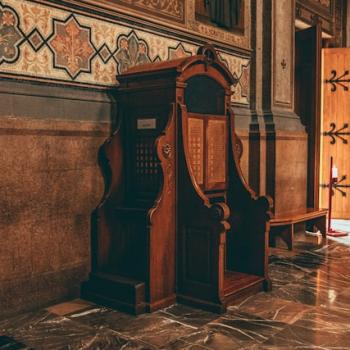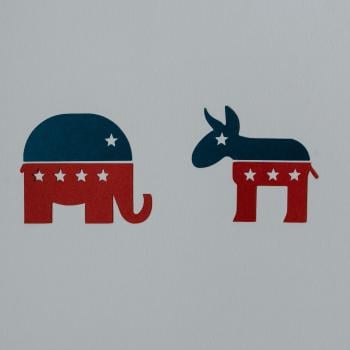In a reversal of decades-long IRS policy, pastors can now endorse political candidates from the pulpit. But this isn’t the blow to the separation of church and state that many believe it to be.
On July 7, 2025, the IRS filed a Joint Motion which overturned a nearly 70 year old tax code provision. The provision, named the Johnson Amendment, permitted 501c(3)’s to advocate for political issues. However, the amendment prohibited nonprofits, including churches, from endorsing or opposing political candidates.
The Beginnings of a Legal Battle
So, how in the world did we get here?
The Johnson Amendment has been a theater of the American culture war for decades. Many religious Americans have seen it as a violation of their First Amendment rights to free speech and religious exercise.
In 1992, a church named Branch Ministries conducted an advertisement campaign against Bill Clinton. The campaign took place in 1992. Clinton would win the election and serve as president until 2001. The advertisements eventually caught the attention of Cornelius J. Coleman, the regional IRS commissioner at the time.

Coleman warned the church that their tax exemption might be revoked. The church responded defiantly, bringing the matter to court. Branch Ministries argued, among other things, that the IRS was infringing on its religious liberty. But in 2000, the United States Court of Appeals for the District of Columbia Circuit ruled that the IRS did not violate the church’s right to free exercise of religion.
This was the first time that the IRS revoked a church’s tax-exempt status. However, while enforcement has been rare, the Johnson Amendment has always been a flashpoint for Christian culture warriors who believe that the provision is violating their religious and speech rights.
Another Culture War
Since then, many Christian culture warriors have railed against the Johnson Amendment. The protestations remained fairly consistent: the provision infringed upon religious liberty and freedom of speech.
In election seasons and other times of political tension, reports of pastors endorsing political candidates abound. Just as Christian culture warriors feel encroached upon by the longstanding Johnson Amendment, secular Americans feel embattled by those Christian culture warriors.
The most recent manifestation of this American cultural conflict is found in a new court case. But instead of making its way up to the appellate courts, this most recent case made it all the way up to the Supreme Court.
The IRS Changes Its Mind About Political Candidates
In National Religious Broadcasters vs. Long, churches teamed up with the formerly named party against the IRS commissioner Long. This is the latest assault on the Johnson Amendment. And it is also the most successful.
Like in prior battles, the Plaintiffs in this case argued that the IRS tax code infringes on religious freedom and free speech. In a Joint Motion filed on July 7th, the IRS capitulated its policy.
In keeping with what’s called the doctrine of constitutional avoidance, the IRS clarified its current stance on the Johnson Amendment. See the excerpt below:
the Johnson Amendment does not reach speech by a house of worship to its congregation, in connection with religious services through its customary channels of communication on matters of faith, concerning electoral politics viewed through the lens of religious faith.
Each word bears immense importance here. Notice that this is specific to churches communicating to its congregation. The mode of communication is one which occurs during an ordinary (or “customary”) religious service. Think sermons, worship songs, prayers, and so on. Furthermore, such communication cannot be strictly about politics and elections, but must be cast through the lens of faith.
Yet despite these restrictions, many have seen this as a danger to the separation of church and state. A flurry of condemnatory statements issued after the IRS’s Joint Motion was filed.
Statement from @AmandatylerBJC on the IRS’s decision to allow churches to endorse candidates from the pulpit.
You can read BJC’s full press release here: https://t.co/YFOXYmlpys#JohnsonAmendment #FaithFreedomForAll #EndChristianNationalism pic.twitter.com/48OZ0SnLqB
— BJC (@BJContheHill) July 8, 2025
But this development, while alarming, is not the assault on American democracy that many think it is.
A Look at the Data
The existing data that we have gives the impression that this new development will be inconsequential to how American Christianity relates to politics moving forward. This reversal of tax code, in other words, will not lead to swaths of pastors backing political candidates. Given that the IRS had already allowed churches to push political issues, we will only be focusing on the data surrounding the endorsement of political candidates. For it is well-known that religion and politics are always already inextricable in congregational contexts.
1. Mainline Pastors Are More Political Than Evangelical Pastors
One of the reasons why this development has made so many headlines is because of the 2016 election of President Donald J. Trump. To be more specific, his white evangelical voter base. In 2016, the Pew Research Center released a preliminary report showing that 81% of white evangelicals voted for Trump. This was significantly higher than what past Republican political candidates received in the past several elections.
Pew’s report generated massive attention on white evangelicals as a means to explain Trump’s rise to power as an inflammatory political outsider. Given the IRS’s radical reinterpretation of the Johnson Amendment, one can surmise that many Americans are fearing that the evangelical pastors will now be endorsing Republican candidates in future elections.
However, the data casts doubt on such a possibility. In her 2013 Harvard dissertation, Katherine M. Woolfalk analyzed tens of thousands of sermons delivered by both evangelical and Mainline pastors. Woolfalk found that evangelical pastors are far less political in their preaching than Mainline pastors are. [1] This is significant. Evangelical pastors are much more likely to vote Republican than Mainline pastors. And Mainline pastors are more likely to advocate for social justice issues than their evangelical counterparts.
2. Few Pastors Endorse Political Candidates in Church
There is not much scholarly data on how often pastors endorse political candidates from the pulpit. One study published in 2003 included endorsing candidates from the pulpit as a measure of clergy political activity. However, it did not focus on that specific act in its analysis.
There is some data collected by Lifeway Research, however. Lifeway is an evangelical research organization, and often has insightful statistics in areas where scholarly research has not yet probed.
In their surveys, Lifeway found that in 2016, 2020, and 2024, only 2% of pastors report endorsing a political candidate in their official role as a pastor.

I am not quite sure how large the sample size was for this data, which makes representativeness difficult to gauge. But the fact that the 2% figure has stayed consistent over three presidential election years is very significant. As a pastor I know once told me,
Most pastors I know won’t openly endorse candidates. The ones who will already do.
It’s Not the Pastors, But the People
Lifeway Research once again offers us a glimpse into what is actually happening in the evangelical world when it comes to pastors endorsing political candidates. It’s not pastors, but ordinary Americans changing their minds on what pastors can or cannot say from the pulpit.
Of the US adults that Lifeway surveyed in 2008, 13% believed that endorsing a political candidate during a church service was acceptable. But in 2024, the percentage had risen to 29%. And even more approve of pastors endorsing political candidates outside of their official role.

This last point deserves more scrutiny. Might there be other surveys with more representative sampling? And would that data show us a different picture? This Lifeway data we must hold loosely. Yet, the consistent trend that Lifeway has detected is still important and worth considering.
A Victory for Whom?
Finally, we come to a close of our discussion of the IRS’s reinterpretation of the Johnson Amendment. I have argued that this radical reinterpretation is not the blow to the separation of church and state that many think it to be. At least, not in itself.
As Lifeway executive director Scott McConnell has said,
Almost all Protestant pastors reserve the pulpit for promoting Jesus Christ rather than a woman or man running for public office.
McConnell is quite right. As researchers Knoll and Bolin observed in 2019, “clergy are motivated to avoid conflict in their congregations.” [2]
The IRS’s reinterpretation is not a win for the vast majority of US Protestant pastors. And those pastors who are more likely to vote Republican are less likely to be explicitly political in their sermons than Mainline pastors. This raises the question- who is this a victory for?
The answer, I believe, is that this is a symbolic victory for the Christian culture warriors who have been waging this battle against the Johnson Amendment for decades. For these activists, this development is a sign that they are winning back America’s soul for God. Of course, much is questionable about a moral vision for one’s nation which depends on the faithful being told who to vote for by their spiritual leaders. Are these culture warriors really trying to win back America for God, or are they trying to win America’s churches for a political party?
Notes
1. Woolfalk, Katherine M. “Essays on social contexts and individual politics: The political influence of religious institutions and ethno-racial neighborhood contexts.” Diss. (2013). 26. [EDIT]
2. Quoted in James L. Guth and Corwin E. Smidt, “The partisanship of protestant clergy in the 2016 presidential election,” Politics and Religion 15, no. 2 (2022): 293.












